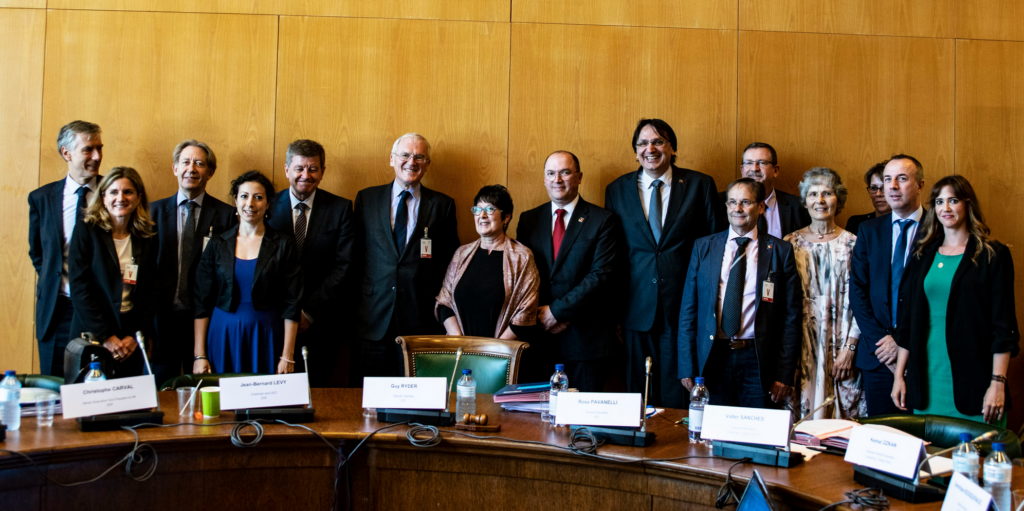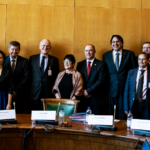15 January, 2019Global corporate power is beyond anything we have ever seen. Some are calling it the triumph of the multinational companies. The limits on the power and will of national governments to call corporations to account for their adverse impacts are clear for all to see. Global corporations are tearing up the social contract, the understanding that in order to operate in a society, companies abide by certain rules in the interests of their workers and the broader public.
Text: Jenny Holdcroft
Even the notion of who their workers are has broken down, lost in the maze of multiple layers of global supply chain subcontracting, outsourcing and agencies, and all designed to allow corporations to evade responsibility for the workers who contribute to their profits.
It is no wonder that calls for more control and regulation of multinational corporations (MNCs) are growing stronger. Self-regulation, supported by company auditing on human rights performance, has lost all credibility, while the plethora of voluntary reporting mechanisms that support it are unable to convince that worker rights are respected.
The United Nations Guiding Principles on Business and Human Rights (UNGPs), endorsed by the UN Human Rights Council in 2011, provide the first UN backed framework for the responsibilities of MNCs. There is wide support for the UNGPs since they synthesize society’s expectations of MNCs, however they fall short of imposing any actual obligations on companies, regardless of whether they adopt or reject the UNGPs.
In response, 84 governments, supported by many civil society organisations, are proposing a binding legal instrument to protect people from human rights abuses by MNCs. In June 2014, the UN Human Rights Council agreed to set up an Intergovernmental Working Group to produce a draft treaty. The first draft of a ‘Legally binding instrument to regulate, in international human rights law, the activities of transnational corporations and other business enterprises’ was released in July 2018. It focuses less on the obligations of MNCs and more on access to remedy and justice by victims of corporate abuse. It does not aim to create or recognize any direct human rights obligations for MNCs under international law, but it would create obligations for states to legislate or otherwise hold businesses legally accountable for abuses committed in their operations1. It contains some mandatory due diligence measures that would entail governments requiring MNCs to identify, prevent, mitigate and account for how they address their human rights impacts, but it is not clear how these obligations would be monitored and enforced by governments, particularly given the current weak enforcement of labour rights in many countries. Another potential pitfall is how companies will be held accountable for abuses in their supply chains. The language in the draft uses a broad definition of liability, including where a company ‘controls’ operations or has a ‘close relation’ with the entity in its supply chain, giving a strong incentive for MNCs to deny or avoid such connections2. We can expect strong opposition from MNCs to such a binding treaty, and the process has a long way yet to go.
In 2016, the International Labour Conference held a tripartite discussion on decent work in global supply chains. The resolution that emerged called on the ILO Governing Body to convene a tripartite or experts meeting to assess the failures that lead to decent work deficits in global supply chains, and to consider what guidance, programmes, measures, initiatives or standards are needed to address this. This meeting will take place in February 2019. Unions will continue to use this process to push for an ILO Convention on global supply chains, though support from employers and governments for a standard that requires binding regulation on MNCs will be difficult to achieve.
In the continuing absence of binding regulation, MNCs are nonetheless sensitive to issues that impact on their reputation. The outpouring of global outrage at the 2013 collapse of the Rana Plaza building in Bangladesh, which took the lives of more than 1,100 workers and injured many more, was felt throughout the textile and garment industry, and most acutely by those brands that were found to have been buying clothing made in the building. In the direct aftermath, sensitivity to having their brand associated with death and maiming drove more than 200 MNCs to sign a legally-binding agreement with IndustriALL and UNI Global Unions – the Accord on Fire and Building Safety in Bangladesh.
Association with major human rights violations can have a real impact on company sales and share value. Pressure is strongest on those companies that directly face consumers, but this is by no means a guarantee that they will respond to calls for change. In 2010, Apple was confronted with multiple suicides of workers making its iPhone at Foxconn in China, but despite the negative media and campaigning, its reputation among its consumers did not suffer (nor its sales) and it succeeded in riding out the storm of criticism. For the many MNCs in IndustriALL’s sectors that have lower brand recognition, there are fewer opportunities for public pressure to drive behavioural change. The demands of the market, investors and shareholders for increased profits will always win out if there is no countervailing pressure.
Confronting global capital
Collective bargaining has long been recognized as an essential tool for workers to use their collective strength to negotiate agreements with employers on their wages and working conditions, to regulate the employment relationship at national, sectoral or company level. These agreements work because they are enforceable.
ILO Convention 98 makes access to collective bargaining a right for all workers and protection of this right is a major priority of the global union movement. But this right does not extend to the global level. Despite clear evidence of centralized control over MNC employment policies in many countries, the primary tool used by unions to temper corporate power, through demands for a fair share for workers, cannot be used to deal with MNC global operations.
For many years now, global unions have been establishing relationships with MNCs at a global level, most effectively through the signing of Global Framework Agreements (GFAs). While the companies that IndustriALL works with are perfectly able to deal with enforceable collective agreements at national level in the countries where they operate, they are much more reluctant to enter into such agreements for their global operations. One notable exception is the Bangladesh Accord.
In the direct aftermath of the Rana Plaza collapse, companies were prepared to sign a legally-binding agreement. Once a number of companies had done so, this made it easier for more companies to accept the same terms. Eventually more than 220 MNCs signed up to being legally bound to their commitments. Clearly, resistance to legally binding global agreements can be overcome once they become more widespread and familiar to companies, in the same way that national agreements already are. As one company representative said during the negotiations for the 2018 Bangladesh Accord, ‘If we make an agreement, we intend to stick to it, so why would we worry about it being legally binding?’
The original 2013 Accord contained a dispute settling process with various stages for resolving issues between the global unions and the corporate signatories. It provided that if a resolution could not be reached, the parties may appeal to a final and binding arbitration process, under a process governed by the UNICTRAL Rules on International Commercial Arbitration. This was the first time that this system had been used to govern labour disputes, and the experience of taking cases under it has provided IndustriALL and UNI with some valuable lessons on its more general suitability as a mechanism for arbitrating global labour agreements.
Lessons learned
In July and October 2016, the two global unions filed arbitration cases against two Accord brand signatory companies with the Permanent Court of Arbitration (PCA) in The Hague. The cases were subsequently joined and heard together. Both hinged on whether the global brands involved met the Accord requirements to require their suppliers to remediate facilities within the mandatory deadlines imposed by the Accord, and to negotiate commercial terms to make it financially feasible for their suppliers to cover the costs of remediation.
Since this was the first such arbitration, initial arguments centred on admissibility (whether the cases could be heard), choice of law (which country’s law should govern the dispute) and procedural matters such as document production. This turned out to be a very heavy and costly process. As no agreement could be reached on a single arbitrator to hear the cases, under the UNCITRAL Rules they went before a panel of three arbitrators, one chosen by the plaintiffs (the global unions), one chosen by the brands and a chair appointed by the PCA. The global unions were required to deposit €150,000 with the PCA to cover the fees and travel of the three arbitrators and the administrative costs of the PCA. For an enforcement mechanism for global agreements to be accessible to trade unions, a better system will need to be found for keeping the costs down.
In order to take these cases forward to arbitration, IndustriALL and UNI needed to find legal representation. This would have been prohibitively expensive and the cases could not have gone ahead without the pro bono representation provided by Covington & Burling. A huge amount of work went into preparing the cases and gathering witness and expert testimonies.
A first procedural hearing took place in March 2017 and established a timetable for the cases to be considered. It envisaged document exchange in October and November 2017, submissions in December 2017 and February 2018 and an oral hearing in March 2018, nearly two years after the original filing.
In September 2017 the Tribunal issued its order that the cases were admissible and could proceed.
In the end, both cases were settled before the oral hearing, which would no doubt have entailed significant additional costs for both the global unions and the companies.
Each of the two brands agreed to pay significant amounts towards the renovation of the garment factories for which they were responsible under the Accord. Confidentiality provisions prevent the brands being identified and the terms of one of the settlements being made public. In the other settlement, the company agreed to pay $2 million towards remediation of more than 150 factories and to contribute a further US$300,000 into IndustriALL and UNI’s joint Supply Chain Worker Support Fund, established to support the work of the global unions to improve pay and conditions for workers in global supply chains. Speaking after the settlements, IndustriALL General Secretary, Valter Sanches, said ‘This settlement shows that the Bangladesh Accord works. It is proof that legally-binding mechanisms can hold multinational companies to account.’
These outcomes show how important it is for global unions to be able to make binding agreements with MNCs that they can subsequently enforce. But the experience also demonstrated the limitations of using existing mechanisms of international arbitration which are neither designed nor suitable for the settlement of industrial disputes.
Where to from here?
IndustriALL, together with UNI, is committed to pursuing genuine global industrial relations through binding agreements with multinational corporations with effective enforcement mechanisms.
While a growing number of agreements are being signed between MNCs and global unions, no mechanism yet exists through which disputes under the agreements can be resolved through conciliation and binding arbitration at global level. Some of these agreements refer to the ILO as a potential arbitrator in disputes, but the ILO has made clear that it is not able to take on this role. If the trade union movement is to achieve its ambition of signing binding global agreements, we must have access to a mechanism for enforcement that avoids the drawbacks of the UNCITRAL Rules process.
This mechanism needs to move much faster: workers cannot wait nearly two years for their case to be heard. It needs to be cheaper: paying for three arbitrators to hear the case is unnecessary. It should not require excessive amounts of documents to be produced: in the Accord cases, huge numbers of documents were exchanged which then needed to be read and analysed. Confidentiality provisions should not prevent global unions from being able to report to their executive bodies and the affected workers on the case. Finally, the mechanism must be directly accessible to trade unions. Global unions must be able to enforce their own agreements without having to depend on their ability to secure pro bono legal representation.
In other words, an enforcement mechanism for global labour agreements needs to be accessible, efficient and effective. For example, there could be one arbitrator chosen from a pre-selected panel; timely conciliation could be encouraged and facilitated to avoid arbitration; document submissions prior to hearing need not be required; timelines could be set that expedite finalisation of the case.
IndustriALL and UNI’s experience with enforcing the binding Bangladesh Accord has underlined the urgent need for the development of a mechanism that is specifically designed for the speedy and affordable resolution of labour disputes at global level, and that can be used to enforce not only the Accord, but any other binding agreements between global unions and MNCs.
The two global unions are using their joint Supply Chain Worker Support Fund to support the development of an international labour conciliation and arbitration mechanism for settling disputes between global unions and MNCs. This will involve analysing existing models of conciliation and arbitration currently used by unions, as well as other models of international arbitration, and extensive consultation with expert persons and organizations in the field.
The new 2018 Accord demonstrates that it is possible to sign binding global agreements with MNCs. The 192 companies which have so far signed the new Accord were not motivated into signing by a recent headline-grabbing disaster as they were after Rana Plaza. They also had five years of experience of a binding agreement. Beyond the two cases that ended up in arbitration, UNI and IndustriALL had taken action to enforce the Accord towards many more brands. Most tellingly, the two companies that found themselves in the arbitration process both signed the new Accord, complete with its legally binding provisions. Work is underway to streamline the Accord dispute settlement and arbitration mechanism to make it cheaper, quicker and more accessible. These changes could point the way towards a potential process that could be used in other agreements.
IndustriALL will continue to push for a binding UN treaty and an ILO Convention on supply chains, while at the same time working towards the development of a specific mechanism to enforce global labour agreements, designed to meet the needs of the global union movement in the pursuit of justice for supply chain workers.



